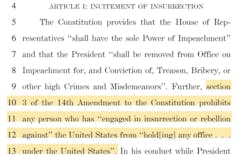
Experts in autocracies have pointed out that it is, unfortunately, easy to slip into normalizing the tyrant, hence it is important to hang on to outrage. These incidents which seem to call for the efforts of the Greek Furies (Erinyes) to come and deal with them will, I hope, help with that. As a reminder, though no one really knows how many there were supposed to be, the three names we have are Alecto, Megaera, and Tisiphone. These roughly translate as “unceasing,” “grudging,” and “vengeful destruction.”
As I’ve been saying, I have a number of articles saved regarding how white supremacy thinks, when it increases, how it expresses itself, and so on – and especially, what to do about it. I hope to get to all of them eventually. This would appear to be the right time for this one.
I’m not sure I would have used the word “arcane” myself – it just hasn’t been looked at or thought much about once it was applied to former Confederates and the last of them died. But it’s a provision which certainly was necessary for Reconstruction to happen – and I’m far from the only one to point out that Reconstruction never fully happened. It was never fully implemented. And it is way past time for that to be done. The measure suggested in this article might not fully implement it, certainly, but at least it would help and not impede our progress.
================================================================
Congress could use an arcane section of the 14th Amendment to hold Trump accountable for Capitol attack

iStock /Getty Images Plus
Until recently, Section 3 of the 14th Amendment was an obscure part of the U.S. Constitution.
The amendment is better known for its first section, which guaranteed individual rights and equality following the abolition of slavery. Section 3 of the 14th Amendment was created to tackle a different problem related to the Civil War: insurrection.
It prohibits current or former military officers, along with many current and former federal and state public officials, from serving in a variety of government offices if they “shall have engaged in insurrection or rebellion” against the United States Constitution.
This section was created after the Civil War as part of the 14th Amendment to bar military officers and civil officials who joined the Confederacy from serving in government again.
Now, this provision is cited in the article of impeachment against former U.S. President Donald Trump, introduced after the insurrectionist violence at the Capitol on Jan. 6, 2021. An impeachment trial is began in the Senate on Feb. 9. If Trump is acquitted, some senators have reportedly considered a resolution invoking Section 3 of the 14th amendment in an effort to bar him from holding future office.

Tom Williams/CQ-Roll Call, Inc via Getty Images
A Reconstruction-era amendment
Right after the passage of the 14th Amendment in 1868, Section 3 was enforced vigorously.
For example, Congress directed the Union Army to oust any former Confederate officials then holding office in the ex-Confederate states still under martial law. It is estimated that tens of thousands of men were made ineligible to serve by Section 3.

U.S. House of Representatives
Congress then enacted legislation as part of the First Ku Klux Klan Act in 1870 giving the Justice Department authority to bring lawsuits in federal court to enforce Section 3 against former Confederate officials still holding office in other states.
Three justices on Tennessee’s Supreme Court were sued under this law. One resigned; the other two contested their ineligibility in court. North Carolina and Louisiana also enforced Section 3 in court upholding in 1869 the dismissal of some state officials who had served the Confederacy, including a sheriff, a constable and a district attorney.
In 1871, after the North Carolina Legislature elected their Civil War-era governor, Zebulon Vance, to the Senate, the Senate deemed him ineligible to serve under Section 3. The state legislature was forced to choose someone else.
Unity versus accountability
Less than five years into Reconstruction, however, many Northerners began calling on Congress to grant amnesty to Southern officers barred from office by Section 3. The 14th Amendment gives Congress the power to restore the right to hold office with a two-thirds vote in each chamber.
This campaign, led by the prominent New York newspaper editor Horace Greeley, reflected white fatigue with the burdens of enforcing the entire 14th Amendment and a desire to move past the bitterness of the Civil War. Greeley and his “Liberal Republicans” mounted a presidential campaign in 1872 based in part on a platform of “universal amnesty.”
President Ulysses S. Grant, who was running for reelection, knew white public opinion now favored amnesty. In a Dec. 4, 1871 message to Congress, he asked lawmakers to grant amnesty to former Confederate officials. After a long and emotional debate, Congress did so in 1872 with the General Amnesty Act.
Soon Southern voters sent many previously disqualified men back to Congress, including Alexander Stephens, the former Confederate vice president.
Confederate president Jefferson Davis and a few hundred other former federal officials and military officers remained excluded from public office.

Wikimedia Commons, CC BY
In granting this amnesty, Congress rejected a proposal by Massachusetts Sen. Charles Sumner, an eloquent advocate for racial equality, to couple forgiveness for white Southerners with a new civil rights law that would, among other things, have barred racial discrimination in schools.
In 1898, with the Spanish-American War about to begin, Congress removed Section 3 ineligibility from all living ex-rebels. It was widely seen as another gesture of national unity, but it was another nail in the coffin of Reconstruction.
Neglected but not forgotten
During the 20th century, Section 3 was largely ignored. It was used just once, during World War I, to exclude the socialist Congressman Victor Berger from the House for his anti-war speeches.
In the 1970s, Congress gave Robert E. Lee and Jefferson Davis posthumous Section 3 amnesty. This was again done in the name of national “reconciliation,” after the divisive Vietnam War.
Today Section 3, created to vanquish white supremacy, is seeing a revival. The Confederate flag, which never entered the Capitol during the Civil War, was carried inside during the Jan. 6 Capitol insurrection.

Stefani Reynolds/Getty Images
Any congressional members determined to have “engaged in insurrection” may be expelled under this provision by a two-thirds vote in their house of Congress. That includes, potentially, lawmakers who are found to have directly aided or incited the rioters. Capitol police are investigating several Republican congressional representatives for allegedly leading “reconaissance” tours of the building on Jan. 5.
Though lawmakers can remove their colleagues from office, they cannot legally keep those members from running for, and occupying, public office again. That’s because there is today no federal statute enforcing Section 3; those parts of the Ku Klux Klan Act were repealed long ago. Unless Congress passes a new enforcement law, any expelled lawmakers could return later.
[Deep knowledge, daily. Sign up for The Conversation’s newsletter.]
Similarly, Congress could at any time use Section 3 to declare its constitutional opinion that Trump is ineligible to hold public office again, with a majority vote. But only the courts, interpreting Section 3 for themselves, can bar someone from running for president.
The issue may never come up. The Senate may disqualify Trump first, as part of impeachment, or he may choose not to run again. If he does run, though, he may have to take his case to the Supreme Court. A bipartisan congressional opinion of ineligibility would be a big blow to his candidacy.
This article, originally published Jan. 29, 2021, has been updated to reflect latest developments.![]()
Gerard Magliocca, Professor of Law, IUPUI
This article is republished from The Conversation under a Creative Commons license. Read the original article.
================================================================
Alecto, Megaera, and Tisiphone, as I type, I’m not hoping for conviction, but I am still hoping for disqualification to be voted on (and confident it will succeed if it is.) By the time this is up, it will probably be over, and I may already be disappointed. but, if so, there is always the 14th Amendment to fall back on. And this procedure would require only a simple majority in both houses.
The Furies and I will be back.
16 Responses to “Everyday Erinyes #253”
Sorry, the comment form is closed at this time.

Thanks Joanne–it is indeed far more complicated than reports of some related proposals make it sound. I also noted the plurality of investigations of alleged Jan. 5th tours. Accountability is so important for healing.
The Orange Ogre had better be convicted this time around. If not, that will clearly demonstrate the cowardice of the GOP, as well as how they put party ahead of country. (Don’t get smug, Democrats – some of you are guilty of this, too.) If tRump escapes conviction a second time, that will almost certainly inspire his bugnut stooges to carry out more insane acts of senseless violence. If he is convicted, those nutsos will definitely react badly. Either way, batten down the hatches because a big storm is about to break!
Freya, it will not happen. I suggest that cowardice runs rampant in the GOP, at the very least.
“The issue may never come up. The Senate may disqualify Trump first, as part of impeachment, or he may choose not to run again. If he does run, though, he may have to take his case to the Supreme Court. A bipartisan congressional opinion of ineligibility would be a big blow to his candidacy.”
If Trump is not prohibited from running again, he may very well like the idea of going to the very SCOTUS he helped poison. Even if he might not be able to count on “his” justices, he would LOVE the spotlight such a maneuver would create.
I do not see congress keeping him from running again, unless this section of the amendment can be passed by a simple majority. Only that way will Kaine’s, or anyone’s billable passed.
I initially thought that dumpy’s claiming interest in another run was just a grifting ploy, as I still believe his run in ’16 was, but,if he’s not in jail he may not be able to resist the impulse to get to center stage again, just for the grift, or not.
It is a major shame that the original impeachment did not convict Johnson, who worked hard to destroy Reconstruction!
The vote to disqualify him from office is a simple majority vote. And myunderstanding from my reading is that it can be taken even if he is acquitted. I may be wrong, but that seems to be what the lawyers are saying.
What Mitch wrote.
BBMM will (most assuredly) vote to acquit the ‘loser’ for him inciting the insurrection.
I can’t wrap my head around what happened, but I sure wished there would be Justice meted out…as dt is guilty of the crime. If he does, it will be the second time around too. UGH!
Thank you, Joanne for post.
To me it is amazingly saddening and maddening how the party of “personal responsibility” is willing to let one dictator-wanna-be to not have to have any responsibility
I could certainly endorse invoking Section 3 of our 14th Amendment – and combine it with a Censure.
And wouldn’t it be nice to include at least senators Hawley and Cruz?
Hawley, Cruz, and Graham at a minimum.
Well, Trump has not been convicted; only 7 Republicans dared to cross the line. And if “Any congressional members determined to have “engaged in insurrection” may be expelled under this provision by a two-thirds vote in their house of Congress” is applicable, Tim Kaine’s plan will be run into the ground too for the same reason.
No, it’s a simple majority. Sorry to sound like a broken record.
Yes, I just watched your Robert Reich video and he said a simple majority was enough too. But I can see what the line of Republican attack is going to be: disputing that simple majority with all they got and accusing Dems of a witch hunt.
Mitch has been warning us that it wasn’t going to happen.
I honestly thought some of the rotten R’s would of changed their minds/votes after seeing the videos this past week at the hearing, but instead I see that they still stand behind tRump.
Then hearing mItch the bi*ch commenting that tRump could still face charges, yet he voted to acquit him, rotten two face creep.
I hope the DOJ can and will follow thru to slap tRump with some law suits to put him away for a long time.
Thanks Joanne
Very well done, JD.
Here’s the problem, as I see it. Republicans will argue that the original intent was to deal with the aftermath of the Civil War, so you know this will end up before the Supreme Court. Since that body is not dominated by SCROTUS (Republican anti-Constitutional VD) the odds are against us.
However, I do think we have a better shot with DOJ and Stare AGs. Trump** will not be stealing any elections, if he’s in prison.
i think everything that can be done should be done. And, should Republicans claim we are not in the aftermath of a Civil War, I suspect they (and the Nation” might get a history lesson they will not like. It is IMO well worth a try.
By all means. I just meant we should not be surprised if we lose.